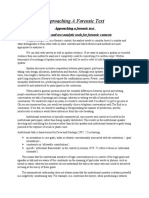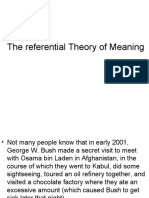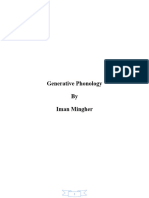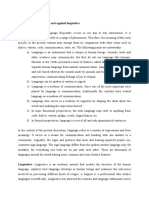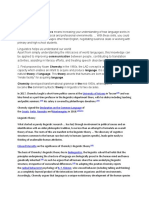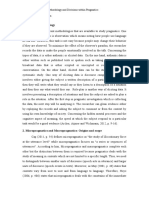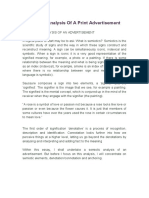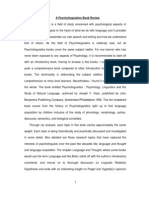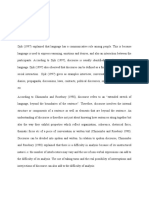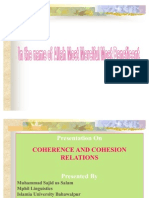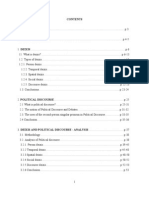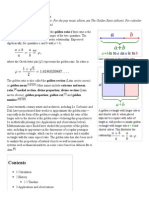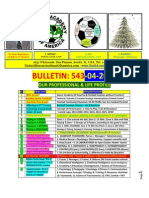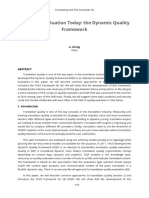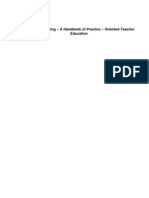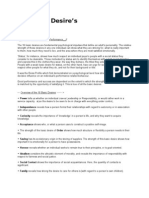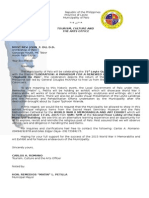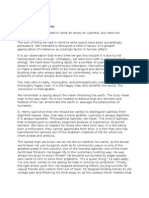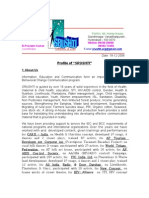0 ratings0% found this document useful (0 votes)
163 viewsSpeech Acts
Speech Acts
Uploaded by
Fitri Sabrina AlwiyahPragmatics examines speech acts and events. There are three types of speech acts: locutionary, illocutionary, and perlocutionary. Locutionary acts involve producing meaningful linguistic expressions, illocutionary acts involve the communicative force of an utterance, and perlocutionary acts involve the effect of an utterance on the hearer. Illocutionary force indicating devices (IFIDs) like performative verbs help convey the intended illocutionary act. Felicity conditions specify the appropriate context for a speech act to be recognized. There are also five classifications of speech acts: declarations, representatives, expressives, directives, and commissives.
Copyright:
© All Rights Reserved
Available Formats
Download as PDF, TXT or read online from Scribd
Speech Acts
Speech Acts
Uploaded by
Fitri Sabrina Alwiyah0 ratings0% found this document useful (0 votes)
163 views15 pagesPragmatics examines speech acts and events. There are three types of speech acts: locutionary, illocutionary, and perlocutionary. Locutionary acts involve producing meaningful linguistic expressions, illocutionary acts involve the communicative force of an utterance, and perlocutionary acts involve the effect of an utterance on the hearer. Illocutionary force indicating devices (IFIDs) like performative verbs help convey the intended illocutionary act. Felicity conditions specify the appropriate context for a speech act to be recognized. There are also five classifications of speech acts: declarations, representatives, expressives, directives, and commissives.
Original Description:
Speech Acts
Copyright
© © All Rights Reserved
Available Formats
PDF, TXT or read online from Scribd
Share this document
Did you find this document useful?
Is this content inappropriate?
Pragmatics examines speech acts and events. There are three types of speech acts: locutionary, illocutionary, and perlocutionary. Locutionary acts involve producing meaningful linguistic expressions, illocutionary acts involve the communicative force of an utterance, and perlocutionary acts involve the effect of an utterance on the hearer. Illocutionary force indicating devices (IFIDs) like performative verbs help convey the intended illocutionary act. Felicity conditions specify the appropriate context for a speech act to be recognized. There are also five classifications of speech acts: declarations, representatives, expressives, directives, and commissives.
Copyright:
© All Rights Reserved
Available Formats
Download as PDF, TXT or read online from Scribd
Download as pdf or txt
0 ratings0% found this document useful (0 votes)
163 views15 pagesSpeech Acts
Speech Acts
Uploaded by
Fitri Sabrina AlwiyahPragmatics examines speech acts and events. There are three types of speech acts: locutionary, illocutionary, and perlocutionary. Locutionary acts involve producing meaningful linguistic expressions, illocutionary acts involve the communicative force of an utterance, and perlocutionary acts involve the effect of an utterance on the hearer. Illocutionary force indicating devices (IFIDs) like performative verbs help convey the intended illocutionary act. Felicity conditions specify the appropriate context for a speech act to be recognized. There are also five classifications of speech acts: declarations, representatives, expressives, directives, and commissives.
Copyright:
© All Rights Reserved
Available Formats
Download as PDF, TXT or read online from Scribd
Download as pdf or txt
You are on page 1of 15
Pragmatics
SPEECH ACTS & EVENTS
Speech acts:
Actions performed via
utterances
• Locutionary Acts: Performed via producing a
meaning linguistic expression
• Illocutionary Acts : Performed via the
communicative force of an utterance
• Perlocutionary Acts: Performed via the effect of
the utterance on the hearer
Locution / Illocution / Perlocution
Distinction between the following:
• Locution => (“the words that are uttered or
written”)
• Illocution => (“the speaker’s or writer’s intention
[...]”)
• Perlocution => (“the intended effect [...]”)
Problem
• The same utterance can potentially
have quite different illocutionary acts
• How can speakers assume that the
intended illocutionary act will be
recognized by the hearer?
Solution
• Illocutionary Force Indicating Devices
(IFIDs)
• Felicity conditions
Illocutionary Force Indicating
Devices (IFIDs)
• Performative verbs
– Used in a simple positive present tense
sentence
– 1st person singular subject
• I promise…
• I sentence you…
• I apologize…
Test of Performative Verbs
• I hereby V …
– I _______ name the ship ‘Elizabeth’.
– I _______ warn you not to sleep in
class.
– I _______ believe that there’s no Santa
Claus.
Felicity conditions
The appropriate circumstances for the
performance of a speech act to be
recognized.
Felicity conditions
“I promise to see you tomorrow’.
• General condi,ons
– The u1erance is understood.
• Content condi,ons
– The content of the u1erance is about a future event and the speaker
is commi1ed to the act.
• Preparatory condi,ons
– The event does not happen by itself.
– The event will have a beneficial effect.
• Sincerity condi,ons
– The speaker does have a genuine inten,on to carry out the future act.
• Essen,al condi,ons
– The u1erance changes the speaker’s state from non-obliga,on to
obliga,on
Speech act classification
• Declarations
• Representatives
• Expressives
• Directives
• Commissives
Declarations
• The speech acts that change the state of the
world via utterances.
– I now pronounce you husband and wife
– We find the defendant guilty.
Representatives
• The speech acts that states what the speaker
believes to be the case or not.
• Statements of fact, assertions, conclusions, and
descriptions
– The world is flat.
– It is a sunny day.
Expressives
• The speech acts that state what the speaker
feels.
• Psychological states (pleasure, pain, likes, joy,
sorrow…)
– I am sorry.
– Congratulations.
Directives
• The speech acts used by the speaker to get
someone else to do something.
• Commands, orders, requests, suggestions.
– Go away!
Commissives
• The speech acts that speakers use to commit
themselves to some future ac,ons
• Promises, threats, refusals, pledges.
– I can’t do that.
You might also like
- Discourse Analysis - WiddowsonDocument20 pagesDiscourse Analysis - WiddowsonCasandra RobledoNo ratings yet
- Readings About ForegroundingDocument2 pagesReadings About ForegroundingShekinahNo ratings yet
- How To Compare Two CulturesDocument27 pagesHow To Compare Two CulturesTihomir BozicicNo ratings yet
- Causativity in English and Arabic LatestDocument16 pagesCausativity in English and Arabic LatestJahid KhanNo ratings yet
- Happy Street EBDocument32 pagesHappy Street EBIvana Arsovska100% (3)
- Updated August 02, 2018: Meaning or Semantic MeaningDocument2 pagesUpdated August 02, 2018: Meaning or Semantic MeaningDinda Hasibuan 005No ratings yet
- The Contrastive Analysis HypothesisDocument1 pageThe Contrastive Analysis HypothesisDorepeNo ratings yet
- Approaching A Forensic TextDocument10 pagesApproaching A Forensic TextKhadija SaeedNo ratings yet
- Pragmatic ImplicatureDocument28 pagesPragmatic ImplicatureEmier Zulhilmi100% (1)
- Thematic Roles: (1) Peter Chased MaryDocument6 pagesThematic Roles: (1) Peter Chased MaryRalucaVieru100% (1)
- 1Document9 pages1sumayya tariqNo ratings yet
- The Referential Theory of MeaningDocument9 pagesThe Referential Theory of MeaningMaida Khan100% (1)
- Hafta 12Document14 pagesHafta 12Md Ismail JanNo ratings yet
- PolitenessDocument31 pagesPolitenessafandena256No ratings yet
- Ambiguities Around UsDocument4 pagesAmbiguities Around UsTan Hiau MianNo ratings yet
- Ma1 Socio Assignment PDFDocument5 pagesMa1 Socio Assignment PDFImed LarrousNo ratings yet
- General Characteristics of Phonemes: Aspects of Speech SoundsDocument8 pagesGeneral Characteristics of Phonemes: Aspects of Speech SoundsElina EkimovaNo ratings yet
- Exophora, Endophora, SubstitutionDocument21 pagesExophora, Endophora, Substitutionmythuan2709100% (2)
- Generative PhonologyDocument20 pagesGenerative PhonologyAhmed MubarakNo ratings yet
- Searle (1975b 1-23) PDFDocument24 pagesSearle (1975b 1-23) PDFWida Hastri WicahyaniNo ratings yet
- Repetition PDFDocument6 pagesRepetition PDFgeegeegeegeeNo ratings yet
- Grice: "Meaning": Intention Based SemanticsDocument8 pagesGrice: "Meaning": Intention Based SemanticsThangneihsialNo ratings yet
- Chapter 16Document6 pagesChapter 16ANNo ratings yet
- Four Aspects of His Theory (Except The Bilateral Model) SassureDocument24 pagesFour Aspects of His Theory (Except The Bilateral Model) SassureJafor Ahmed JakeNo ratings yet
- Basic Concepts in LinguisticsDocument15 pagesBasic Concepts in LinguisticsAli Raza Bokhari100% (1)
- Sociolinguistic AssignmentDocument11 pagesSociolinguistic AssignmentRiska Alfin Pramita100% (1)
- Discourse Analysis DR A Morgan PDFDocument7 pagesDiscourse Analysis DR A Morgan PDFMariana CostaNo ratings yet
- Semantics of HumorDocument17 pagesSemantics of HumorPoorva Dubey100% (1)
- Significance of LanguageDocument2 pagesSignificance of LanguageMohammad UmarNo ratings yet
- Schools of LinguisticsDocument3 pagesSchools of LinguisticsJake WyattNo ratings yet
- Chapter 10:gender Group 10Document16 pagesChapter 10:gender Group 10andreaNo ratings yet
- Psycholinguistics CompleteDocument30 pagesPsycholinguistics CompleteSiti QomariahNo ratings yet
- Applied LinguisticDocument23 pagesApplied LinguisticFatulousNo ratings yet
- Some Key Concepts in Modern LinguisticsDocument27 pagesSome Key Concepts in Modern LinguisticsKosovych Olga100% (1)
- Applied LingDocument11 pagesApplied Lingحسام جدوNo ratings yet
- Relative Clause in English and ArabicDocument27 pagesRelative Clause in English and ArabicJormandoAndradeNo ratings yet
- Language Choice (s1)Document12 pagesLanguage Choice (s1)Bagas TiranggaNo ratings yet
- Pragmatics Research Methodology and Divisions Within PragmaticsDocument13 pagesPragmatics Research Methodology and Divisions Within PragmaticszaNo ratings yet
- Corpus Stylistic: Presented By: Quissa Marie M. Gonzales-BSED Presented To: Dr. Arjan EspirituDocument16 pagesCorpus Stylistic: Presented By: Quissa Marie M. Gonzales-BSED Presented To: Dr. Arjan EspirituQuissa GonzalesNo ratings yet
- A Semiotic Analysis of A Print AdvertisementDocument1 pageA Semiotic Analysis of A Print AdvertisementSamie WingSum YuNo ratings yet
- Transformational-Generative Grammar: (Theoretical Linguistics)Document46 pagesTransformational-Generative Grammar: (Theoretical Linguistics)Les Sirc100% (1)
- Psycholinguistics - A Book ReviewDocument2 pagesPsycholinguistics - A Book Reviewzila63500% (1)
- Linguistic RepertoireDocument7 pagesLinguistic RepertoireSumanth .s100% (1)
- Theoretical Framework of Patient Doctor DiscourseDocument8 pagesTheoretical Framework of Patient Doctor DiscourseValorson CoachsultingNo ratings yet
- Introduction..Polysemy and HomonymyDocument6 pagesIntroduction..Polysemy and HomonymyClaudia Elena NegurăNo ratings yet
- 4th Chapter Levels of StyleDocument4 pages4th Chapter Levels of StyleSamar Saad0% (1)
- Binding TheoryDocument30 pagesBinding TheorySuliemanNo ratings yet
- Cohesion and Coherence 1224552963587167 8Document77 pagesCohesion and Coherence 1224552963587167 8Najah Sofea100% (1)
- Rcaillet,+ Code+Switching +in+Sociocultural+LinguisticsDocument22 pagesRcaillet,+ Code+Switching +in+Sociocultural+Linguisticste kooNo ratings yet
- Approaches To DiscourseDocument26 pagesApproaches To Discoursenabeelajaved100% (1)
- Fina Outline Sa Reader ResponseDocument6 pagesFina Outline Sa Reader ResponseKatrina AmotoNo ratings yet
- Lecture 2 - ForegroundingDocument57 pagesLecture 2 - ForegroundingGintarė Potaškinaitė100% (1)
- Applied LinguisticsDocument2 pagesApplied LinguisticsmeiraNo ratings yet
- Discourse and GenreDocument6 pagesDiscourse and GenreCharlo ChalloNo ratings yet
- Yule Chapter 19 NotesDocument4 pagesYule Chapter 19 Notestsm hashinshinNo ratings yet
- DEIXISDocument62 pagesDEIXISAnca Alexandra DascăluNo ratings yet
- Defining Multilingualism: See Discussions, Stats, and Author Profiles For This Publication atDocument37 pagesDefining Multilingualism: See Discussions, Stats, and Author Profiles For This Publication atNana Alfi KarrilaNo ratings yet
- Homonyms: Grigoryeva MDocument37 pagesHomonyms: Grigoryeva MMarrianne FranciscoNo ratings yet
- ForegroundingDocument23 pagesForegroundingAdelina Surlea100% (1)
- Golden Ratio EverythingDocument28 pagesGolden Ratio Everythingneiljain421No ratings yet
- Evidentiality and German Attitude Verbs: University of Pennsylvania Working Papers in LinguisticsDocument12 pagesEvidentiality and German Attitude Verbs: University of Pennsylvania Working Papers in LinguisticsastrinurdianiNo ratings yet
- Bulletin 543 Quarter Finals - Finals of UEFA Club Champions - 2014Document16 pagesBulletin 543 Quarter Finals - Finals of UEFA Club Champions - 2014Dr. Victor StanculescuNo ratings yet
- Quality Evaluation Today: The Dynamic Quality FrameworkDocument10 pagesQuality Evaluation Today: The Dynamic Quality FrameworkIvanNo ratings yet
- Frantz 2017 Blackfoot Grammar, 3rd Ed. (U Toronto Press)Document285 pagesFrantz 2017 Blackfoot Grammar, 3rd Ed. (U Toronto Press)高橋 英海.No ratings yet
- Crimsoc Target AnswerDocument10 pagesCrimsoc Target Answersalic calimbaNo ratings yet
- Pedagogy Enjoying TeachingDocument118 pagesPedagogy Enjoying TeachingAlmira Alic TurcinovicNo ratings yet
- 16 Basic Desire'zDocument3 pages16 Basic Desire'zmilkb0ne_rNo ratings yet
- Invitation Letters For 2015 Exhibit ContributorsDocument3 pagesInvitation Letters For 2015 Exhibit ContributorsGiles DayaNo ratings yet
- Lesson 1 - The Understanding of The Human Person in The Ancient PeriodDocument17 pagesLesson 1 - The Understanding of The Human Person in The Ancient PeriodHayness DullasNo ratings yet
- The Disappearing Whistling Language of GreeceDocument3 pagesThe Disappearing Whistling Language of GreeceKat SugarNo ratings yet
- On Laziness: by Christopher MorleyDocument3 pagesOn Laziness: by Christopher MorleyenemesioNo ratings yet
- EDU 325 - Group Lesson PlanDocument8 pagesEDU 325 - Group Lesson Plandrd92No ratings yet
- PPG Week2 PPT Political IdeologiesDocument35 pagesPPG Week2 PPT Political Ideologiesmixdeep31No ratings yet
- Bioregionalism: By: Ana ContrerasDocument10 pagesBioregionalism: By: Ana ContrerasjackNo ratings yet
- Summary by FordDocument6 pagesSummary by FordPark JiminNo ratings yet
- GuiaDocument13 pagesGuiaLaohu Wuxia100% (4)
- English 9-Q4-M2Document14 pagesEnglish 9-Q4-M2rose mae arboledaNo ratings yet
- Absolute Advantage & Comparative AdvantageDocument3 pagesAbsolute Advantage & Comparative AdvantageArpit RastogiNo ratings yet
- Physioveda Blog Final PDFDocument6 pagesPhysioveda Blog Final PDFPhysio VedaNo ratings yet
- Cbcs (Final)Document72 pagesCbcs (Final)Bikash Kumar NayakNo ratings yet
- Harsiddhi Temple in UjjainDocument4 pagesHarsiddhi Temple in UjjainRanjith KumarNo ratings yet
- Inspiring Science Education Teacher GuideDocument48 pagesInspiring Science Education Teacher Guidesaqib aslamNo ratings yet
- NSCI 201 2013 SyllabusDocument5 pagesNSCI 201 2013 SyllabuscreativelyinspiredNo ratings yet
- A Qliphothic Rite of Malediction and VampyrismDocument2 pagesA Qliphothic Rite of Malediction and VampyrismTalon Bloodrayn100% (2)
- Module 16 16Document2 pagesModule 16 16Maria Ana PatronNo ratings yet
- Profile of SrushtiDocument8 pagesProfile of SrushtiPraveenNo ratings yet
- Chem CurriculumDocument3 pagesChem CurriculumWilliam DC RiveraNo ratings yet
- F2F Oral PT Question Bank PDFDocument3 pagesF2F Oral PT Question Bank PDFGisela Cardoso80% (5)







